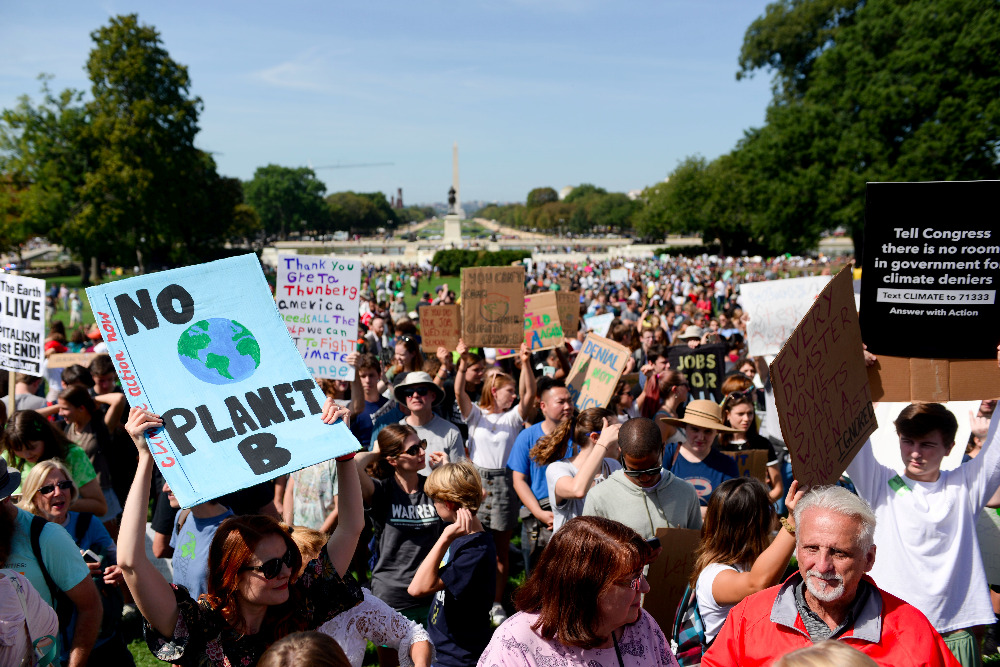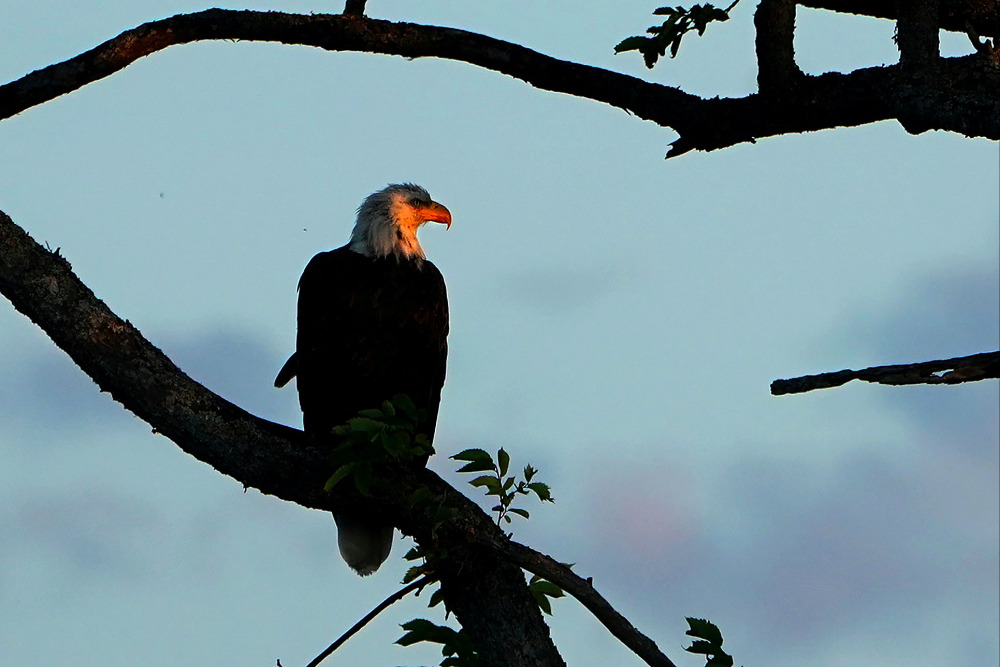
Climate change activists rally in Washington in September 2019. (CNS photo/Carol Zimmermann)
Editor's Note: EarthBeat Weekly is your weekly newsletter about faith and climate change. Below is the Oct. 30 edition. To receive EarthBeat Weekly in your inbox, sign up here.
The Earth is approximately 4.54 billion years old. But today, EarthBeat turns exactly 1.
Yes, it's been a full year since National Catholic Reporter launched EarthBeat, a dedicated news section devoted to covering how people of faith are experiencing and responding to climate change and environmental challenges around the world.
In this first year, EarthBeat has published upwards of 400 stories. That includes breaking news reports, in-depth features, interviews, explainers (Burning Questions), reader-submitted "Small Earth Stories" and five spiritual reflection series that have coincided with Advent, Lent, the Season of Creation and more.
EarthBeat debuted just as the Vatican's Synod for the Amazon was concluding. And it arrived in time for the fifth anniversary of Pope Francis' social encyclical on the environment, "Laudato Si', on Care for Our Common Home," the 50th Earth Day and the rise of a global pandemic that has posed significant consequences for both people and the planet. And our reporting has carried datelines from around the globe: Italy and Ireland, Costa Rica and Peru, New Zealand and Zimbabwe.
Safe to say, it's been a busy first year.
To mark EarthBeat's birthday, I've gone back through our coverage and compiled a list of some of our most-read stories, some staff favorites and few worth a second look.
Most-read news articles:
- Dominican sisters commit $46 million to seed new climate solutions funds (June 18): Sixteen Dominican congregations partner with Morgan Stanley to invest in addressing climate change and meeting the U.N. Sustainable Development Goals.
- Creighton University president rejects student recommendation to divest from fossil fuels (Feb. 20): Jesuit Fr. Daniel Hendrickson initially opted not to act on a November student referendum calling for full divestment, though the university later approved a partial divestment plan, though students press for more.
- How the University of Dayton divested from fossil fuels — and what happened to its bottom line (July 14): The Ohio-based Marianist school did fully divest back in 2014. And this is how they did it and what happened next.
- What is the Season of Creation? (Aug. 28): A Burning Question explainer on the annual time of year for Christians to praise, pray and act for the earth.
- Environment, other issues beyond abortion are critical in voting, bishop says (Sept. 15): Bishop John Stowe responds during a webinar to questions about priorities for Catholics to consider ahead of the 2020 U.S. election.
EarthBeat staff favorites:
- Where can I learn more about environmental racism? (June 11): A Burning Question explainer by Jesse Remedios that was retweeted by noted biologist Ayana Elizabeth Johnson and "Veep"/"Seinfeld" actress Julia Louis-Dreyfus.
- Should we have kids? (Jan. 31): Brittany Wilmes speaks with young Catholics who are weighing whether to bear children with their concerns about climate change.
- Hymns, teach-ins and a horse ride to school: Catholic stories of the first Earth Day (April 21): My look back at how Catholics participated in the first Earth Day celebrations 50 years ago.
- Church's social justice teachings inspire young climate activist (March 3): Meet Isabella Johnson, a Catholic teen helping to organize a major Earth Day protest in Chicago before the coronavirus pandemic upended plans.
- Laudato Si' validates centuries of indigenous knowledge to defend nature (June 5): Patricia Gualinga, a Kichwa indigenous leader in Ecuador, looks at what the pope's encyclical means for the Amazon.
- Basil, tomatoes and the magic of compost (Oct. 22, 2019): A Small Earth Story by Fara Warner on composting at home, which inspired inaugural EarthBeat editor and now-NCR publisher Bill Mitchell to begin filling a compost pail of his own.
Worth a second read:
- Vatican office invites church on journey to 'total sustainability' in next decade (May 17): Perhaps the year's biggest Catholic environmental story, the Vatican unveils a major grassroots plan to push the global church to sustainability. It's a story we'll continue tracking.
- Election 2020: How seven climate-conscious young Christians are deciding their vote (Sept. 22): With the U.S. election just days away, revisit how young Christians view their votes through lenses of faith and climate.
- Impeded by pandemic crisis, dreams and goals of Amazon synod endure (Oct. 9): EarthBeat editor Barbara Fraser explores how the church in the Amazon is working to implement the synod's many conclusions.
- What does climate change demand of Catholic education? (April 10): A look at how Catholic teachers and schools are leveraging Laudato Si' into lesson plans, and the still-uphill struggle to ingrain it into school culture.
- Lens on Creation (Aug. 31-Oct. 2): In this spiritual reflection series, photographer Paul Jeffrey tells the stories behind his captivating images of people and places experiencing the consequences of environmental degradation.
Readers react to last week's EarthBeat Weekly:
Susan Vogt had doubts about efforts by Brazil's Rio de Janeiro Archdiocese to recycle plastics. "This is good," she wrote, "BUT what happens to the plastics collected? The article said it was sent to somewhere in Canada. Of course that means transportation and fuel costs (by ship or air). And what does Canada do with the recycled plastics? From what I read, the market for recycled plastics is dwindling.
"The better solution is to reduce the consumption of single-use plastics, thus driving the producers of plastic to change to produce other commodities. This would also help reduce the pollution that the production of plastics causes by fracking and the petrochemical industry. More energy needs to be put into this preventive solution beyond just collecting plastics after they have been used."
"Reduce before recycle" is advice Vogt gave us last February, too, in a Small Earth Story.
Reader Maeve Race took issue with scientists who said that pandemic lockdowns had made it difficult to get pesticides to combat Africa's locust plague. "The knee-jerk reaction of 'scientists' is appalling," she wrote.
"Not only have they forgotten Silent Spring, they clearly know very little about Africa. Pesticides would kill not only locusts, but many other creatures (insects, birds, amphibians, reptiles, small mammals), including those that eat locusts, and the many creatures that eat those that have died from the locust poisoning.
"Furthermore, pesticides would pollute the whole environment. Not only that, but locusts themselves are also a nutritious food source for people. Generally speaking, native Africans are partial to eating locusts, and they are 'manna from heaven' for hungry and malnourished people suffering from the effects of drought and floods. Squeamish westerners may not find them appetizing, but so-called experts should not be imposing their own tastes when seeking solutions to environmental disasters."
Race recognized the damage locusts cause to crops and the local economy, but added that "killing so-called 'pests' has never been the solution to the environmental disasters resulting from global industrial, economic and agricultural plundering."

Rachel Carson's momentous work, "Silent Spring," warned of the hazards of pesticides for birds and other wildlife. (CNS photo/Chaz Muth)
Here's what else is new on EarthBeat this week:
- Young people may grab the most headlines for climate protests, but NCR Bertelsen intern Lucy Grindon found that elders are also climate activists, spurred on by concern about the world they are leaving to their children and grandchildren.
- A new poll found that more than three-quarters of Catholics consider climate change a serious or somewhat serious issue and are concerned about it. That's slightly higher than the national average of all voters, reports Dennis Sadowski at Catholic News Service.
- An 83-year-old Jesuit priest imprisoned in India on terrorism charges was targeted because he has long defended the land rights of the country's indigenous people, a top Jesuit official told EarthBeat editor Barbara Fraser.
- And from Louisiana, Claire Schaeffer-Duffy tells the story of a Black Catholic woman who is leading the fight against a huge plastics factory that would spew more toxic emissions over low-income neighborhoods already suffering from marginalization and pollution.
Here's some of what's new in other climate news:
- Emily Holden at The Guardian explains how the appointment of Supreme Court Justice Amy Coney Barrett could affect climate change policy in the United States.
- Devastated by a powerful tornado in 2007, tiny Greensburg, Kansas, rebuilt in a way that halved its carbon footprint. Annie Gowen at The Washington Post looks at the lessons other cities could learn from it.
- Sangmi Cha at Reuters reports that South Korea has pledged to go carbon neutral by 2050. That comes on the heels of a similar announcement from Japan, writes Adam Vaughan in New Scientist.
- And the Philippines declared a moratorium on new coal-fired power plants, reports Chloé Farand at Climate Home News.
- Globally, switching to low-carbon energy sources in ways that would meet the Paris Agreement targets would require just a fraction of the $12 trillion that governments have pledged in economic stimulus funds to recover from the pandemic, Joseph Winters reports for Grist.
Upcoming events:
"COP26 — Ramp up ambition" is the second in a three-part series of webinars, "Visions for transformative climate action," sponsored by the Lutheran World Federation.
This session brings together representatives from the scientific, policy and faith communities for an interdisciplinary discussion on the agenda for COP 26, originally scheduled for November but postponed until next year, and what it means for climate action now.
You can find more information about this and other events on our Upcoming Events page.
Closing beat:
Our celebration of EarthBeat's first year is also a celebration of you, our readers, and your commitment to making the world a better place for all of us, human and other-than-human beings alike. Thank you for your continued support.
You've heard my thoughts about EarthBeat's first-year coverage. What stories were your favorites, and which do you think are worth reading again? Let us know at earthbeat@ncronline.org.
If you like EarthBeat Weekly, why not share it with a friend? Feel free to forward this newsletter or pass along the link to EarthBeat Weekly on our website. And if someone forwarded it to you, you can sign up here to receive the newsletter in your inbox every Friday .
Thanks for reading EarthBeat!
Brian Roewe
NCR environment correspondent
broewe@ncronline.org
Advertisement






